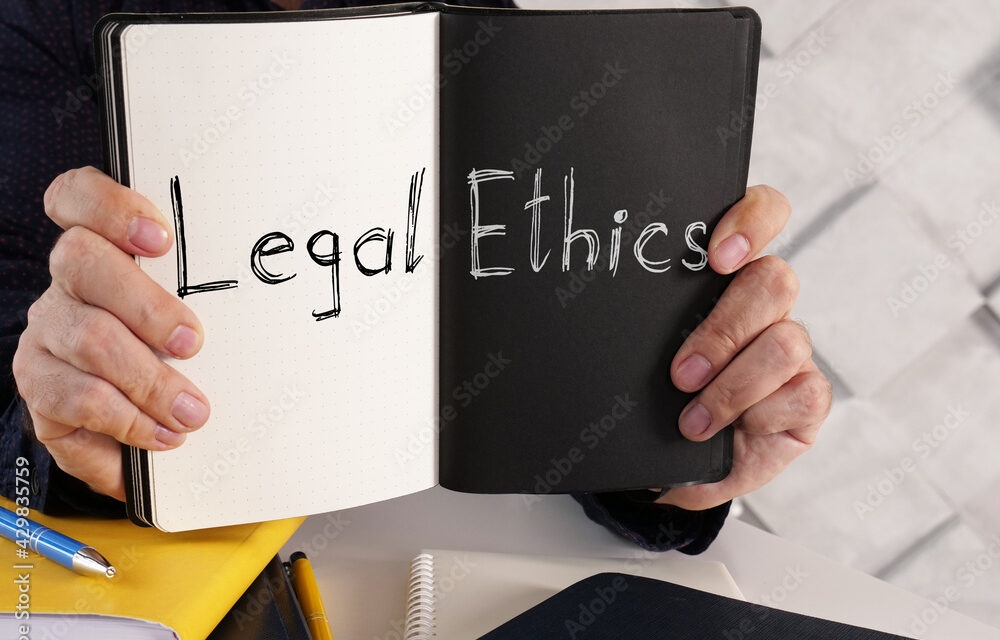ETHICS OF THE LEGAL PROFESSION: GENERAL ETHICS
PART II
In Part I, I suggested that legal ethics, as generally understood among lawyers, is mostly some sort of code–a quasi-legal code of conduct governing the minimally acceptable conduct of persons who are lawyers when they are functioning as lawyers. I indicated that there would be a Part II and that it would cover one of the frameworks within which legal ethics should be understood. This framework is what I will call “general ethics.” Part II is theoretical and abstract. Anyone wishing to do so can skip it and go to Part III. It is not abstract and concerns the Texas Lawyers Creed.
In Part I, I called the rules more, as opposed to less, accepted all over the United States a “quasi” code (or better, “quasi-codes,”) and did so for several reasons. First, there are actual statutes that regulate lawyer conduct, and there are principles set forth by courts. But only parts–small parts–of recognized legal ethics are, strictly speaking, actual legislative products. or even precedent from courts.
Often, as in Texas, at least parts of the quasi-codes are mandated such entities as supreme courts. Some of them are at least partly products of state bar associations. Some versions of them have comments on various of the rules, the purpose of the comments being to explain the “true” meanings of the rules. There may be other sources of legal ethics coming from authoritative sources, like supreme courts. Texas, for example, has a “Texas Lawyer Creed” which is important but not really law, or even quite law-like. All states, I think, have oaths new lawyers commit to when they are sworn in for the first time, often there are official and/or semi-official commentaries on these oaths.
In any case, this is Part II which will outline a conception of general ethics. which is unquestionably one of the implicit sources or silent frameworks of legal ethics. To some extent, this discourse might be described as a sketch of a college-level freshman ethics course offered by the philosophy departments of most secular universities, and many religious ones. I myself have a somewhat religious (Christian) point of view, but I don’t think for a moment that all the foundations of ethics must be religious. (I also confess that I am not sure how the essence of Jesus-demanded conduct fits with the adversariality built into the American version of adjudication–not that I’ve let that restrain me much.)
Readers will notice that I have already “confessed” that what is sketched here is not a universally accepted view of philosophical, theoretical, or general ethics; there isn’t one. I think my sketch is attractive for several reasons; one of them is that it will fit the lawyerly mind. Or, so I say.
—MSQ
These observations ould be called the fundamentals of “meta-ethics.” Here are some fundamentals. The way the language and ideas are being formulated here may strike readers as confusing. Take heart: it is.
First, ethics and morals should be thought of and classified differently, even though the concepts of “ought” and “oughtness” are central to both of them. What might be called “morality” has a different use than the term “morals.” The way I’m going to use these two terms trades on their ambiguity.
Morals are ought-and-ought-not norms widely accepted by this or that society as to the standard and (usually) informal governance, outside the law, of proper conduct. They differ widely from society to society. In democratic societies that are usually pluralistic in important ways. It goes with liberty that there will always be controversy as to what should be counted as the morals of that society. Bases for disagreement are multiple, even in one society. (Right away the careful reader is wondering about what the “should” in the last sentence means and whither its origins and foundations.)
Of course, the established morals of any given society will show up in the law of that land and will be part of the established professional ethics. Indeed, this will be true for all professionals. (Well, it’s a little more complicated than this. Sometimes the morals or ethics of a society run ahead of the law. Law is a constitutionally conservative institution. Established ethics and morals are too, but often less so. The word “constitutional” here is not intended to refer to the Constitution; rather, it is a way to talk about the essential nature of the thing.)
Various ethical views are one source of disagreement, and the reader will see what I am talking about presently. It is important to keep in mind that the morals of a given society may include some ethical principles, and defenders of the “oughts” of a given society will equate the two ideas.
Thus, I am treating “societal morals” or “morals as understood in this or that society as facts. I am including accepted principles, guide-lines, the like, as empirical facts. Morality and therefore moral principles can be understood differently. In order to try and overcome this ambiguity, I will use the term “moral,” “morals,” and the like as is, with a small initial letter, “m.” When I am referring to independently prescriptive moral principles and the like, I will begin with a large letter, “M.” There is nothing wrong about using one term–“moral(s)– in both contexts, but a simple change of lettering will mostly eliminate the ambiguity.
I will treat the idea of ethics differently. If a reader, in his/her own mind, thinks this is a distortion, then think of my distinction as a stipulation. I shall return to what I am calling “ethics” shortly.
Here is one important area of morals in America and Europe presently: sexual conduct. American society just now is relatively permissive about adult unmarried persons and nearly-adult persons having sex in pairs where there is mutual consent. There are controversies about this norm, mostly involving persons who regard this norm as error–“too “loose”–and who wish and strive to cause it to become less permissive. There can be hardly any controversy about whether this sort of conduct is regarded as moral or part of the morality of the American culture. There is a great deal of controversy about whether it (or some parts of it) are Moral. Oddly enough, sex between male lawyers and at least female clients is condemned by established morals in America, there is a Moral controversy about it.)
The morals of most societies include at least parts of the legal systems of those societies. Thus, there is often continuing controversy regarding the relationship between the morals of a society and its legal system. Of course, the same applies to the relationship between a society’s system of morals and philosophical or general Morals.
Many of the morals of a given society are less serious than others. Some social norms are not morals at all but matters of manners, though the borderline between the two–manners and minor moral matters–is sometimes blurry.
As a matter of semantics, I need to make several points. I am thinking of morals as an empirical fact, sociologically speaking. I do the same with ethics, i.e., prescription about how people should treat one another. All systems of societal morals include accepted ethics and ethical principle. Thus, I will use the term “ethics” to apply to general “trans-societal” interpersonal prescriptive principles and rules. I am treating what I shall call Ethics differently–one could say, more abstractly or more philosophically. Often ethics and Ethics are the same. A recent book is entitled “What We Owe Each Other.” I am not trying to talk about that book, but only trying to use its title.
This is not a usage of language distinction that everyone makes. Nor is it built into our languages as always a sharp distinction. One place where the distinction is often not made in conversation and discourse is the meaning of the term “morality.” Often this word is used to cover both what I am calling “morals” or “moral norms” and what I am calling “Morals, calling “ethics” and what I am calling “Ethics” which is designed to connote “general ethics” of “trans-national” “ought,” “morally must,” and “morally obligatory” principles and rules.
What I am calling “general Ethics” is not the same as “legal ethics,” although as a matter of fact “legal ethics” includes and should be thought of as including general Ethics. To use my vocabulary, “legal ethics” is certainly a kind of societal ethics, since there is general agreement as to its contents at least in a given group and probably in many sectors of the general population. I believe legal ethics should be rethought to more explicitly include some ideas from general Ethics.
What I am calling general Ethics are principles for the conduct of persons in general. The term “conduct” is intended to mean how we treat one another. Thus, Ethics is about obligations people owe each other Ethical principles are how we ought to treat each other. When it comes to motivating, reasoning, and judging conduct it is Ethical principles to which we turn. Some of them are highly abstract; some of them are often thought to be universals. They are the principles and ideas by means of which we consider the worth of existing morals and proposed morals in this or that society. The prescriptions of general Ethics are called “obligatory.” They are described as “Ethical duties,” and those to whom duties are owed are said to have “Ethics-based Rights.” I remind the reader that Ethics is hot the same as ethics.
Of course, the morals of a given society will contain behavioral norms as to how people should treat one another. I am using “morals” in a socio-empirical way, and sometimes established “ought statements” are just that. (“In the X society, it is believed that people ought to keep their promises. This is a fact about the ethics of that society.” I also happen to believe that it is part of general Ethics. Most other people believe this as well, but it is not always a matter of fact about society. It is a normative principle. )
(Sometimes, these duties, obligations, and rights are said to be “Moral Obligations.” I will not use this phraseology, however, because I am trying to use the term “moral” as a sociological term pretty much restricting it to the moral of this or that society. I do this fully knowing that sometimes the prevailing morals of a given society are thought to be inadequate, and I will discuss this later.)
Remember. My way of distinguishing accepted empirically established often agreed upon morals, including ethics from theoretical ethical and moral principles is to use capital letters: “M” for moral; “E” for ethics; “O” for obligation; “R” for rights. My method is simply a convention to reduce ambiguity and therefore confusion.
Fundamental approaches to general ethics are often called “ethical theories.” Here are some examples: utilitarianism, Kant’s “categorical imperative,”* Ethics as taught by Jesus, Ethics as taught by Paul, stoicism, epicureanism, hedonism, virtue ethics, and many more. Some are independent approaches, and some are variations on the “big” independent theories. Most of them place reason–and the exercise of reason–at or close to the center of ethical theory. The same goes for argument, where that idea is reasoning from premises to conclusions. (*Roughly this is Kant’s principle: One must treat each person in the same way one rationally believes you should be treated.)
Nihilism is obviously not a type of Ethical theory; it is the rejection of all Ethical theories and all Ethical theorizing. It is not, however, a rejection of the existence of morals and moral principles, treated as sociological facts. Ethical relativism is not nihilism. It is a rejection of the idea that there are universal Ethical principles that apply to everyone under all circumstances. Instead, there is a degree of choice–even rational preference–involved. Ethical relativism as a set of academic ideas is somewhat out of fashion just now and tends to be very individualistic It may be a rejection of the idea of objectivity when it comes to Ethical principles.
I am inclined to believe that Ethical theory should be divided into two parts. The first one is valuable states of affair. This could be called “Value Theory.” It is also often called “the search for the Good,” or simply “Good states of affairs.” The other half is “action theory.” It pertains to principles designed to guide and/or dictate what actions should be done or not done. Thus, it could also be called Ethical act-and-omission theory. My fundamental axiom is that values drive and limit action theory. The Good comes first and Ethics follows. Thus Ethics and Morals are what we ought to do is to adopt and act in accordance with reasonably embraced values., i.e., versions of the Good or Goodness.
In fact, Value theory is often referred to or described in an abbreviated way as Morality itself. As the reader might immediately observe, I am capitalizing the first letter, because societies have established conventional value system and important values, so I want to emphasize the difference between empirical facts (“This society values X.”) from transnational, rational prescriptive valuing, so I use “V” for the latter. Of course, all moral systems existing in this or that society with include Values as well as values.
The time we talk about the Good as being Moral Perfection, or we say that the really Good is a matter of the Ideal.
Of course, there are many values, so one component of Ethical and Moral theory is to try and select fundamentals regarding what is actually Valuable and adopt decision procedures for balancing competing values. Individuals must do this, as do communities and societies. Interestingly, even though Ethical-action theory is subordinate to Value theory, (what is actually Valuable), one can reason about Values by looking at what action a given value theory will generate or reject. I regard this as a paradox in ethical theory.
As with any other exercises of reason, definitions and clarity are important, though they are not the only things that are important. Judgment, grasp, insight, emotion, hypothesis, doubt, wisdom, and intuition also have roles. This is much less true for systems of morality and ethics, than it is for Morality, and Moral systems. It is much less true for values and value systems established in this or that society than it is for Values established by thought, etc. and Value systems that are similarly established.
Since ethical theory as a whole involves value selection and defense, as well as action principle selection and defense, ethical theorizing is to some extent speculative, as is all of philosophy, though many ideas which can be thought up are unacceptable as separate acceptable ethical theories.
Interestingly, one of the best ways to begin spelling out acceptable ethical theories is to start with action principles that everyone invariable accepts. This is also a good way to reject right from the start that in ethical theorizing the contra-ethical principle “Anything goes” and its twin “Everything goes.” (I call these two the “Cole Porter Principle.”)
Here an example of the teaching device with which I have has consistent success: “It is wrong to torture infants and very young children simply in order to find pleasure in one’s immediate circumstances; it’s wrongful.” Here’s another: “Fathers should not rape their young daughters or their very young sons for that matter; it’s wrongful.” Of course, much broader principles are also pretty obviously objectively true.
The narrow examples are a teaching tool designed to demonstrate to doubting people the possibility that some ethical theories are true and objective, without making explicit reference to the values which underly them. One can then use these universally accepted ethical principles regarding acts and omission in order to move on quickly to value theory. The way to do this is simply to ask, “Why are these actions principles true? How can they be justified?” The answer will pertain to values.
Like ethical-action principles, principles regarding values or valuable states of affairs come at different strengths. Some values are more important than others, and some values may not really be ethical matters. As with all of philosophy, the search is for the “real thing” at fundamental level. The questions then become “What values are the most important ones?”
The history of ethical theory to some degree has been the attempt to find the most fundamental ones. One of the most popular answers over many centuries is human happiness. Sometimes people reject this view; these days and at the time of Aristotle, human well-being and human-flourishing are suggested as candidates.
Sometimes people try and find something more fundamental out of which happiness is generated. Pleasure is one of the most popular attempts in this direction, although everyone agrees that momentary pleasures that are fleeting cannot by themselves be a real candidate. Thus, hedonism in its crudest forms is always rejected as foundational.
Readers should notice that the ambiguous term “moral” surfaces again here in the realm of ethical value theory. Sometimes the search for and attempts to establish fundamental values is called “the search for the moral life.” Obviously, the term “moral” here is not being used in its sociological sense.
Readers might also find it helpful to think of what goes on in the area of ethical value theorizing is often called a search for “the good,” while ethical theorizing oriented toward ethical action theory is called a search for “the right.” One of the ideas for which I am arguing is that legal ethics should involve not only principles of right action in the practice of law but also principles regarding the good in the practice of law. William Chriss once made the same sort of point in a book entitled “The Noble Lawyer.” It’s work reading and rereading.)






Recent Comments